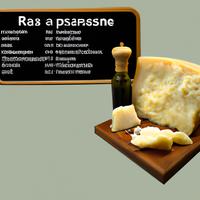
1 serving (28 grams) contains 110 calories, 10.0 grams of protein, 7.0 grams of fat, and 1.0 grams of carbohydrates.

Log this food in SnapCalorie

Nutrition Information
Calories |
940.2 | ||
|---|---|---|---|
% Daily Value* |
|||
| Total Fat | 59.8 g | 76% | |
| Saturated Fat | 38.5 g | 192% | |
| Polyunsaturated Fat | 0 g | ||
| Cholesterol | 213.7 mg | 71% | |
| Sodium | 3333.3 mg | 144% | |
| Total Carbohydrates | 8.5 g | 3% | |
| Dietary Fiber | 0 g | 0% | |
| Sugars | 0 g | ||
| protein | 85.5 g | 171% | |
| Vitamin D | 59.8 mcg | 299% | |
| Calcium | 2820.5 mg | 216% | |
| Iron | 1.7 mg | 9% | |
| Potassium | 222.2 mg | 4% | |
* Percent Daily Values are based on a 2,000 calorie diet. Your daily values may be higher or lower depending on your calorie needs.
Food Attributes
Source of Calories
About Fresh parmesan cheese
Fresh Parmesan cheese, traditionally known as Parmigiano-Reggiano, hails from Italy and is celebrated as one of the finest cheeses in the world. Made from cow’s milk, it undergoes a meticulous aging process that can last up to two years, resulting in its characteristic grainy texture and nutty, savory flavor. Parmesan is naturally rich in protein, calcium, and phosphorus, essential nutrients for bone health and muscle function. It is a low-lactose cheese, making it easier to digest for those with lactose sensitivities. However, it is also high in sodium and saturated fat, so it’s best enjoyed in moderation. A versatile addition to Italian cuisine, Parmesan enhances flavors in dishes like pasta, risotto, and salads. Whether shaved, grated, or melted, fresh Parmesan adds depth and aroma to any meal while offering beneficial nutrients in each serving.



